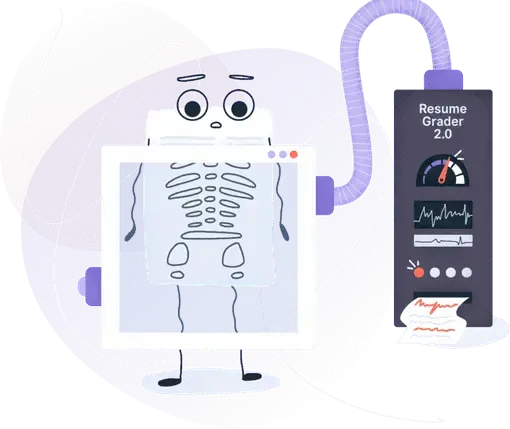Data Collection Skills: Example Usage on Resumes, Skill Set & Top Keywords in 2025
Including data collection as a skill on your resume conveys to recruiters your ability to gather and analyze information effectively. Dive into the guide below to find valuable tips and different expressions to enhance your resume's appeal.


Is your resume ATS-friendly?
Drop your resume here or upload a file to find out if the skills in your resume are readable by an ATS.
Data collection is a skill that involves gathering information, often through observing, questioning, or measuring, to gain insights for research, decision-making, or improvement of practices. Acquiring this skill means you can effectively gather and analyze information from various sources, which is valuable in many job roles that require fact-based conclusions or understanding trends.
Adding data collection to your resume can prove to your potential employers that you have the ability to gather and handle information efficiently. However, if not presented correctly, it might come across as a vague or assumed skill assumed for most positions. Instead, illustrate your data collection experience with specific examples or connect it to successful outcomes from past projects to make it stand out to hiring managers.
In this article, you will learn:
- Common drawbacks of listing data collection as a skill on a resume and how to avoid them.
- Why providing specific examples improves the impact of your data collection skill on your resume.
- Good and bad examples of how to show data collection skills, synonyms, and alternative phrasings.
Misusage of data collection on resumes
Having strong data collection skills is vital for many positions, but representing these skills accurately on a resume is just as critical. Misrepresenting your abilities can lead to a mismatch between job expectations and your actual expertise, potentially impacting your professional reputation. For example:
- In the summary section, stating "Expert at data collection with flawless execution in all projects" when you've only performed basic data entry tasks misrepresents your level of expertise.
- In the experience section, writing "Led data collection initiatives for company-wide decisions" when your role only involved inputting data into a spreadsheet gives a false impression of leadership and impact.
- In the achievements section, claiming "Increased company revenue by 50% through innovative data collection methods" without concrete evidence or when the increase was not directly attributable to your actions can be misleading.
How to demonstrate data collection skills on your resume
- Quantify your experience by including specific figures that show the scale of data you've managed or collected, such as the number of records processed, datasets analyzed, or the amount of data cleaned and organized.
- Detail the types of data collection tools and software you are proficient with, such as SQL databases, Google Analytics, or survey platforms, to showcase your technical abilities in gathering and handling data.
- List projects where you identified key data points, designed collection methods, and successfully gathered the necessary information, demonstrating your practical experience in running data collection campaigns.
- Highlight any experience in ensuring data quality and validation, which might include using specific techniques or software to verify data accuracy and consistency.
- Describe your ability to analyze and interpret collected data by mentioning any insights, reports, or decisions that were influenced by your findings, thereby proving your competency in making data-driven decisions.
Example 1: Demonstrate data collection in the experience section
- •Led a team that improved search algorithm efficiency by 15%, resulting in a 10% increase in user engagement across our platforms.
- •Directed the development of a new predictive search feature that saved on average 2 seconds per search query, enhancing user satisfaction.
- •Implemented a series of code optimizations that reduced server response times by 30%, significantly increasing throughput during peak hours.
- •Oversaw a project that developed a new inventory tracking system, reducing stock discrepancies by 25%.
- •Coordinated cross-departmental teams to implement a supply chain solution that cut shipping times by 20%, enhancing customer satisfaction.
- •Orchestrated the migration of legacy systems to cloud-based platforms, facilitating real-time data access and improving operational decision-making.
- •Interpreted data from over 500 million users to guide the redesign of the news feed algorithm, boosting content relevancy by 35%.
- •Collaborated with product teams to utilize big data in shaping future marketing campaigns, resulting in a 20% increase in ad revenue.
- •Presented analytical reports to senior managers, enabling strategic investment decisions based on user trends and behavior patterns.
- Use recent and specific work examples, focusing on concrete achievements with quantifiable results.
- Detail the individual contributions made to projects and the direct impact these had on the company's success.
- Vary language to keep descriptions dynamic and engaging, avoiding repetitive expressions.
- Ensure each bullet point is reflective of a different skill or aspect of work experience to showcase a range of abilities.
- Tie each bullet point to overall business objectives and demonstrate your role in attaining them.
- Make your experience relatable to the job you're applying for, indicating how past work prepares you for future roles.
Example 2: Demonstrate data collection in the summary section
- Demonstrates an extensive work history with over a decade of experience, highlighting durability in the tech sector.
- Reflects a candidate’s professional capabilities with concrete details like proficiency in Java and cloud computing.
- Showcases a notable professional milestone with the development of an award-winning SaaS product, implying quality and excellence.
- Conveys genuine enthusiasm by emphasizing a readiness to tackle complex projects and a commitment to ongoing professional development.
- Communicates a results-oriented mindset, suggesting that the applicant is focused on delivering tangible outcomes.
When constructing your own resume summary with Excel skills, follow this good example:
- Specify your experience by stating exactly how many years you have been working with Excel.
- Highlight your most impressive or unique Excel-related achievement to grab attention.
- Show enthusiasm for working on Excel projects, but don't rely on overused terms or jargon.
- Align your skills with the needs of the role, but without simply restating job posting language.
- Keep a direct, clear writing style that can be easily understood at a 6th-grade reading level.
- Ensure that each sentence adds substantial information about your experience and capabilities.
Example 3: Demonstrate data collection in the achievements section
- The achievements show clear quantifiable results, such as "surpassed quarterly sales targets by 20%" which emphasizes the applicant's effectiveness.
- Use of numbers and percentages, like "reduced operational costs by 15%", gives concrete evidence of the applicant's accomplishments.
- Descriptions give context to the achievements and show impactful work situations, for instance, "streamlined inventory management system increasing efficiency".
- Titles are concise, yet informative, being limited to a maximum of 8 words, which helps with quick scanning of the content.
- Each entry is focused and well-defined, avoiding vague terms and providing specific examples of the applicant's skills and results.
- No jargon or buzzwords are used; the language is simple, making the content accessible to readers of all levels.
- The achievements are presented in a manner that directly connects the applicant's actions to business outcomes, demonstrating their role in the success.
- The descriptions are sufficiently detailed, giving weight to the achievements without being overly long or complex.
What are the relevant certifications for data collection skills on resume
These certifications can help expand your expertise in gathering and analyzing data:
The top 5 certifications for gaining data collection skills expertise:
This certification covers the fundamentals of data collection methods and tools, preparing you for efficient and accurate data gathering.
Focused on data science, this course dives into data collection techniques as part of a broader curriculum, equipping you with necessary analysis skills.
PRC validates your knowledge in market research, including comprehensive data collection to support business insights.
This certificate emphasizes on market research skills, with a significant focus on data collection strategies for market analysis.
Providing a broad view of the analytics process, this certificate includes training in data gathering, cleaning, and organizing to support decision-making.
Top skills people add together with data collection skill on resume:
Data Analysis
Data Management
Statistical Analysis
Research
Data Entry
Database Management
Data Mining
Data Visualization
Microsoft Excel
SQL
Attention to Detail
Critical Thinking
Problem-Solving
Communication
Organization
Time Management
Adaptability
Teamwork
Analytical Thinking
Active Listening
Persistence
Most relevant jobs for data collection skills
Jobs that require data collection skills are essential across various industries for analyzing trends, improving services, and informing business decisions. People in these roles are tasked with gathering accurate information, monitoring and recording a wide range of data, and then using that data to drive strategic planning and operational improvements. Strong data collection skills entail precision, attention to detail, and an ability to work with numbers and statistics. These capabilities are crucial in research, marketing, healthcare, and tech industries, where the impact of data-driven decisions can be significant.
- Data analyst
- Market research analyst
- Research scientist
- User experience (UX) researcher
- Epidemiologist
- Data engineer
- Business intelligence analyst
- Operations research analyst
- Healthcare data analyst
- Sociologist
Key takeaways
- Data collection skill enhances your resume by showing you have the ability to gather and analyze information.
- Avoid misusing this skill by not manipulating data or violating privacy; use data ethically.
- Show your data collection expertise on your resume through specific examples of past projects and the results you achieved.
Make one that's truly you.




